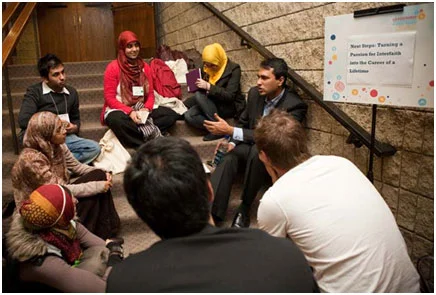Featuring Eboo Patel
A TIO Editorial
Eboo Patel with a group of college students. – Photo: Lavina Melwani
This year TIO has devoted its March-July issues highlighting a handful of contributors who have made a special mark in the interfaith community and been particularly generous in contributing to this journal. This month we are happy to share the work of Eboo Patel, a 41-year-old Muslim who grew up in Chicago, did his PhD at Oxford as a Rhodes Scholar, then founded the Interfaith Youth Core. Today IFYC has a staff of 45, a $6.5 million annual budget, and a laser-like focus on developing interfaith leadership in the confines of higher education in the United States.
Courtney Martin’s introduction to her August 2012 interview with Patel in the Stanford Social Innovation Review beautifully captures Eboo’s remarkable mission of interfaith peacebuilding in a religiously violent world. She writes,
It’s easy to feel helpless when reading about the recent shooting at a Sikh gurdwara on the south side of Milwaukee, Wisconsin. What could possibly counter the kind of weaponized prejudice that resulted in the death of seven and traumatic injuries – both literal and emotional – to so many more?
Eboo Patel, one of the country’s most dynamic interfaith leaders, has an idea. Get kids from different religious backgrounds together while they’re young. Don’t talk at them. Get them working side by side, serving others. Their friendships will change the world.
The Interfaith Youth Core (IFYC), the organization he founded, has been doing just this to great effect for over a decade. Its mission is “to make religious pluralism a social norm within the course of a generation.”
Lest its method sound simple, think again; Patel and his team base their chosen intervention on rigorous academic research from the likes of Harvard sociologist Robert Putnam, as well as McKinsey-backed corporate research on how they can actually have impact, not just light candles and talk about “tolerance.”
(Go here for the full interview.)
Five month’s earlier TIO published a profile of Patel, “Spokesperson in the Making.” Sacred Ground: Pluralism, Prejudice, and the Promise of America (2012), his second book, had just been published. It followed in the steps of Acts of Faith (2005). In both we find an engaging personal journey enmeshed with the story of founding one of the strongest interfaith organizations in the world, all the while wrestling with major issues confronting the interfaith movement.
In this 15-minute TED talk, Eboo Patel tells of the two women who played formational roles in his own personal, spiritual journey.
Now comes Interfaith Leadership: A Primer, to be published this August by Beacon Press. It continues in the same rich story-telling fashion, this time plumbing the depths of serious, bridge-building leadership in a world beset with huge difficulties. The goal of making “religious pluralism a social norm within the course of a generation” informs all three books. But in this new Primer it becomes personal, surveying what you need to know and the critical skillsets involved in interfaith leadership, along with a vision of what might be achieved and how we can help the process.
IFYC’s growing success is catching attention. Two months ago the New York Times published a story, “A Laboratory for Interfaith Studies in Pennsylvania Dutch Country,” about the first college graduates in the country to receive degrees in interfaith leadership in a program at Elizabethtown College (Pennsylvania). The new major was inspired by visits from Eboo Patel. Across the country thousands of undergraduates, graduates and seminarians have received IFYCleadership training. They have a good time at the training and in taking ‘Better Together’ festivals to their home-campuses. But the fruit of this work will grow year after year as graduates from hundreds of campuses take the message of friendship and collaboration with ‘the other’ into a world badly in need of both.


